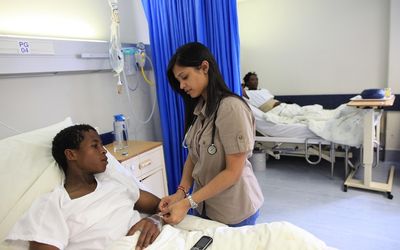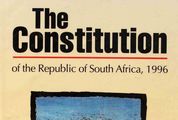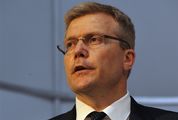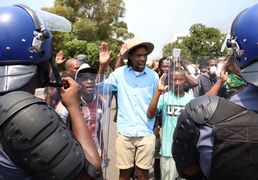SA’s life expectancy has hampered its growth, putting it second-last in the category, on the 2015 Human Development Index.
In his presentation of the index in Sandton on Wednesday, senior economist at the United Nations Development Programme Osten Chulu, said SA’s life expectancy of 57.4 years was what brought the country down in the index.
The index places countries into four categories: very high human development; high human development; medium human development, and low human development.
SA is one the two lowest-ranking members of the five emerging economies, Brazil, Russia, India, China and SA (Brics).
Russia, Brazil and China are in the high human development category, with SA and India at the tail end of the group with medium human development.
The very high development category is occupied by countries such as Norway, Australia, the US, the UK and Saudi Arabia. No African countries make it into that category.
Countries on the index are assessed in terms of inequality, gender development, gender inequality and multidimensional poverty.
On the positive side, SA’s gross national income has increased 11.8% between 1980 and 2014.
Education has also seen some improvement, with the number of years spent in school increasing by five years between 1980 and 2014.
Mr Chulu gave his presentation of the 2015 Human Development in Sandton yesterday under the theme Work for Human Development.
He said: "The measure (index) shows how (much) better we have become (compared to the 1990s)." The theme emphasises the global need for jobs and work which aid in development.
"Jobs provide income and support human dignity, participation and economic security," said Mr Chulu.
He said the years between 1990 and 2015 saw a "huge" shift in human development, with 2-billion people moving up from low human development.
Good as this is though, the world still faces developmental challenges — 795-million people are still unable to put food on their tables, 800-million adults are illiterate, 204-million people are unemployed (74-million of them are young people) and despite being employed, 830-million people still live in poverty.
Gender equity is also a long way from being achieved. The report stated: "Globally women earn 24% less than men and hold only 25% of administrative and managerial positions in the business world."
Cumulatively, "African women spend more than 200-million hours a day fetching water," said Mr Chulu.
He added that women worldwide took on the most unpaid work — in SA, women spend 129 minutes a day on paid work and 229 minutes on unpaid work.
South African men on the other hand spend 214 minutes on paid work per day, and 98 minutes on unpaid work.
He said reducing the amount of unpaid work for women would go a long way in aiding with their development.
The report is based on 156 countries covering 98% of the world’s population.
© BDlive 2016

SA is one the two lowest-ranking members of the five emerging economies, Brazil, Russia, India, China and SA. Picture: SUNDAY TIMES
SA’s life expectancy has hampered its growth, putting it second-last in the category, on the 2015 Human Development Index.
In his presentation of the index in Sandton on Wednesday, senior economist at the United Nations Development Programme Osten Chulu, said SA’s life expectancy of 57.4 years was what brought the country down in the index.
The index places countries into four categories: very high human development; high human development; medium human development, and low human development.
SA is one the two lowest-ranking members of the five emerging economies, Brazil, Russia, India, China and SA (Brics).
Russia, Brazil and China are in the high human development category, with SA and India at the tail end of the group with medium human development.
The very high development category is occupied by countries such as Norway, Australia, the US, the UK and Saudi Arabia. No African countries make it into that category.
Countries on the index are assessed in terms of inequality, gender development, gender inequality and multidimensional poverty.
On the positive side, SA’s gross national income has increased 11.8% between 1980 and 2014.
Education has also seen some improvement, with the number of years spent in school increasing by five years between 1980 and 2014.
Mr Chulu gave his presentation of the 2015 Human Development in Sandton yesterday under the theme Work for Human Development.
He said: "The measure (index) shows how (much) better we have become (compared to the 1990s)." The theme emphasises the global need for jobs and work which aid in development.
"Jobs provide income and support human dignity, participation and economic security," said Mr Chulu.
He said the years between 1990 and 2015 saw a "huge" shift in human development, with 2-billion people moving up from low human development.
Good as this is though, the world still faces developmental challenges — 795-million people are still unable to put food on their tables, 800-million adults are illiterate, 204-million people are unemployed (74-million of them are young people) and despite being employed, 830-million people still live in poverty.
Gender equity is also a long way from being achieved. The report stated: "Globally women earn 24% less than men and hold only 25% of administrative and managerial positions in the business world."
Cumulatively, "African women spend more than 200-million hours a day fetching water," said Mr Chulu.
He added that women worldwide took on the most unpaid work — in SA, women spend 129 minutes a day on paid work and 229 minutes on unpaid work.
South African men on the other hand spend 214 minutes on paid work per day, and 98 minutes on unpaid work.
He said reducing the amount of unpaid work for women would go a long way in aiding with their development.
The report is based on 156 countries covering 98% of the world’s population.
© BDlive 2016



























Change: -1.46%
Change: -1.32%
Change: -1.02%
Change: -1.11%
Change: -3.27%
Data supplied by Profile Data
Change: 0.34%
Change: 0.21%
Change: -1.46%
Change: 0.00%
Change: 0.51%
Data supplied by Profile Data
Change: 0.00%
Change: -0.03%
Change: -0.10%
Change: -0.22%
Change: -0.11%
Data supplied by Profile Data
Change: -0.40%
Change: 0.00%
Change: -0.20%
Change: -0.71%
Change: 0.05%
Data supplied by Profile Data